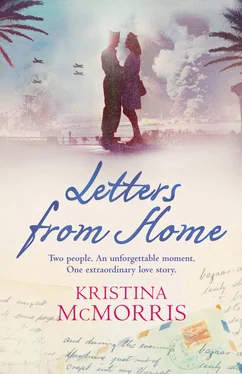“I will, sir. Thank you.”
While other girls might, Liz never felt a bit embarrassed over her boyfriend’s lack of uniform. She preferred his safety to the unknown. Apparently so did his father, who’d made it clear that the primary obligation of his only son was to carry on the family name. That the nation would best benefit from his political prowess, not the sacrifice of his blood. With Mr. Harris’s connections, a deferment, or stateside defense job at most, was a surety should Dalton ever be drafted. A relief to Liz, on one hand; on the other, frustration that the decision wasn’t viewed as his own.
“Good night, Elaine,” Mr. Bernstein said to Liz while leaving. “Oh, and son”—he turned back, bumping a busboy in passing— “tell your father to give me a call. We’ll see what we can do to get that man the seat in Washington he deserves.”
Face alight, Dalton nodded. “Any support would certainly be appreciated.”
Another shark reeled in.
Dalton was in the midst of sitting down when their waiter returned and set a dome-covered plate before Liz. She peered up at the man. “I’m afraid there’s been a mistake. I didn’t order any dessert.” Her desire to get home squashed any craving for a decadent torte.
Without a word, the server removed the lid in a grand arc, the dome pinging above his head.
Obviously, no one was listening to her tonight. She would be better off skywriting a message. “Sir, I said I didn’t order—” The objection died on a gasp, strangled by the sight of the small box on her plate.
A sterling box.
For a ring.
Dalton reached across the table and clasped her hand. “Elizabeth.” He spoke slow, articulate. “We’ve known each other for as long as I can remember.”
Her hands tingled with fear of where this was leading, of sentences resembling a life-altering speech. She focused to hear him over the quick thumps of her heart. Every word carried a pulse. She strained for each vital syllable, to confirm that merely an early birthday present lay before her. Or a Christmas gift—in August.
“Thanks to our grandfathers, you were the little pest I was stuck playing with every summer.” Nostalgia seeped into his voice. “For years I thought of you as a kid sister. But eventually, it became clear our friendship was destined to grow into something more.”
A proposal. It was a proposal. Too soon, it was too soon!
“Dalton,” she stage-whispered, “I thought we were going—”
“To wait, I know. But there’s no reason we can’t make our plans official now. In less than two years, I’ll have my degree and you’ll have enough credits to graduate early. Still top of your class, knowing you. Then we can finally start our lives together. With my practicing law, and your professorship, we’ll be . . . unstoppable.” He smiled, eyes twinkling like sapphires.
“But my father—”
“He’s already given his permission.”
The statement clattered in her head. “He what?”
“He said so long as you had a degree in your hand first, we could sign the marriage license whenever we wanted.”
Her life, in an instant, became a runaway train. The velocity left her breathless. “You spoke with him?”
“On the phone last week. Told me he was absolutely delighted.”
Absolutely delighted. Did he use those very words? Ones that conveyed an actual emotion? The image of her father wearing an expression in the realm of happiness slowed her thoughts, lessened her alarm. His acceptance of Dalton, though established long ago, had never implied such zeal. Perhaps with the inclining prominence of the Harris family, their marriage could resuscitate her father’s approval.
Certainly, she favored that possibility over the alternative: his delight but a form of relief, her wedding vows marking the end of his parental obligations.
Dalton slid from his chair and knelt before her. He picked up the box and creaked open the lid. “This ring has been in my family for four generations.” He pulled the heirloom out of the turquoise velvet tuck. A beveled emerald shone at the center of the star etched into the gold band. Five small diamonds winked between each point. “If you’ll have me, Lizzy, it would be my honor to pass it along to you.”
Either the restaurant had fallen silent or shock was hindering her hearing. No tinking of silverware, no lobbing of laughter.
He peered into her eyes. “Elizabeth Stephens, will you marry me?”
The question burned in her ears, its heat stretched down her neck. Her tongue was cold, absent a reply. She glanced over Dalton’s shoulder, stalling to produce her answer. Against a swagged velvet curtain, their waiter stood at attention. She wanted to ask him to open a window before the pressure bowed the fabric-lined walls. But the bottle of champagne in his hand, surely intended for her table, indicated his task card was full.
“Elizabeth?” Dalton said.
She returned to the ring, then to Dalton’s face. When he leaned forward a fraction, candlelight brushed a caramel glow over his skin, erasing the hard lines on his forehead. Before her eyes, he reverted to the boy she’d grown up with. Dalton Harris, her child-hood friend. The one who spent a week by her side when she had chicken pox, playing jacks while stuffing themselves with Baby Ruth bars. The same one who taught her how to ice fish and took her to her first dance. The guy who’d held her hand at her grandfather’s funeral.
And now, here he was, matured into a man, offering his devotion and security. What girl in her right mind would say no?
Liz drew a breath. Under the gaze of the entire room, she smiled. Then nodded.
Applause erupted as Dalton guided the ring onto her finger. It was halfway on when her knuckle resisted the band. She winced from a second push. A feeling of self-consciousness stirred inside, an itch she couldn’t reach. Was the coliseum of spectators interpreting the mismatched size as a bad omen?
“I think it might be a little small,” she said quietly.
“It’s okay, it’ll fit.” Determined as always, he twisted the band one way, then the other, as if the solution were a matter of angle.
“No, Dalton, really.” He shoved harder, pinching her skin. “Ow!” she cried, halting him.
He raised his eyes, and his whole body sighed. “I’m sorry,” he told her. “This isn’t going the way I’d planned.” His crestfallen tone released a rush of compassion in Liz, and, in its wake, regret for misjudging his behavior throughout dinner.
“It’s no problem.” She shrugged. “I’ll just have it resized.” Smiling, she shifted the ring onto her pinkie. “Until then, this should work.”
Soon a beam returned to his face. He pulled her hand toward him and stood to embrace her. The audience caught a second wind and clapped louder.
“I love you, Lizzy,” he said into her ear.
She closed her eyes, relished the familiarity of his arms, his musky scent. “Me too,” she replied, holding him tighter.
This was right. This made sense. You didn’t need chills or flutters or illusionary magic from a fleeting dance. Just the loyalty and devotion of someone who cared. Any other notions were better left as daydreams.
Of this she was certain.
Chapter 8
Late August 1944 Chicago, Illinois
Two Fridays in a row, and still no sign of her. That was the thought still scratching at Betty’s mind as she waited at the bus stop on Michigan Avenue. Nobody at work could recall how many years Irma had been frequenting the diner, eating in that far booth— Irma’s booth—but it was long enough to leave an arresting hole when she didn’t show two weeks ago.
A cross-country trip. A visiting relative or a seasonal cold. These were the theories tossed among the staff like hamburger patties, kneaded and molded as reasons for her absence, shaped into the most tantalizing form. Yet as much as Betty strained to visualize the woman pleasuring in a lengthy train ride, or painting the town red with a long-lost cousin, she simply couldn’t. The possibility of a severe cold, on the other hand, the flu maybe, was the only explanation upholding Betty’s hopes after the first missed Friday.
Читать дальше












